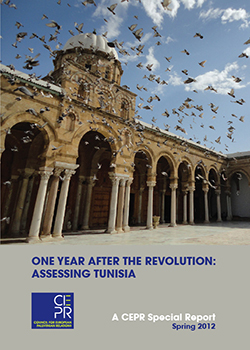Executive Summary
Between March 31 - April 3, 2012, the Council for European Palestinian Relations (CEPR), in association with the Jasmine Foundation, organised a fact-finding delegation to Tunisia. The members of this delegation consisted of political advisers and parliamentarians from the UK, Ireland, Scotland, and the European Parliament. The delegation met with civil society, youth groups, the President, the Minister of Human Rights, leaders of both the main and opposition political parties, members of the Constitutional Assembly, and the British Ambassador in Tunisia.
The purpose of the visit was to assess the political situation in Tunisia one year after the Jasmine Revolution that toppled President Zine al-Abidine Ben Ali from power. It also provided the opportunity for European parliamentarians to engage actively with the "new" Tunisia.
Tunisia is undergoing a period of transition. The experiences of Central and Eastern European countries, following the collapse of the USSR, highlight some of the challenges that are now faced by Tunisia in its move to democracy. These challenges are amplified by the severe lack of governing experience held by the new political elite, as well as the social and economic problems inherited from the last regime. Nonetheless, Tunisia has responded remarkably well to the steep transitional learning curve it has faced.
The political transformation of Tunisia over the last year has given a genuine sense of optimism for the future of the country. The UK Ambassador stated that Tunisia's current political climate is the best that could have been envisaged a year ago at the start of the revolution.
 Protesters during the Jasmine Revolution that ousted Ben Ali on January 14, 2011.
Protesters during the Jasmine Revolution that ousted Ben Ali on January 14, 2011.
While Tunisia's democratic path is progressing relatively smoothly, there are other challenges that need to be met. As Tunisia searches to strike the right balance between liberty and stability, the issue of security needs to be carefully monitored.
By far the greatest challenge facing the country, though, is the desperate state of the economy. With graduate unemployment rates of 23%, there is growing evidence of civilian disillusionment with the government's progress. The economic climate was a central factor for sparking the revolution in 2011, and this has worsened over the course of the year. The tourism industry has taken a substantial downturn in the wake of the revolution, and this is something that urgently needs to be addressed. In a time of global economic hardship, and when only limited aid can be expected from a cash-strapped EU, Tunisia must find a way of generating and distributing wealth in order to secure future prosperity and political stability.
Despite the challenges faced, the delegation was impressed and encouraged by their experience in Tunisia. In the context of other countries undergoing dramatic shifts following the Arab protests, Tunisia is notable for the peaceful nature of its transition and the emphasised importance of governance through consensus. As the initial trigger of the geopolitical phenomenon labelled the 'Arab Spring', it is not surprising that the eyes of the world have been on this otherwise small country. Its achievements in establishing successful elections, drafting a constitution, and successfully incorporating Islamic and secular viewpoints into the political establishment, can surely be seen as a model for the region.
To read the full report, click here: One Year After the Revolution, Assessing Tunisia
To order hard copies, contact Communications Officer:
This e-mail address is being protected from spambots. You need JavaScript enabled to view it



